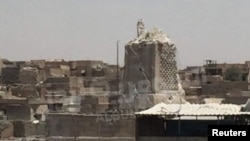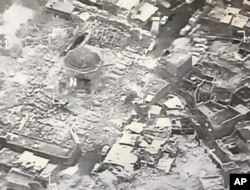The U.N.'s office of the high commissioner for human rights has condemned the destruction of the historic al-Nuri mosque by Islamic State militants in the battle-scarred Iraqi city of Mosul, calling it a war crime.
The U.N. human rights office says the destruction of the ancient monument on Wednesday is just the latest in a long list of atrocities perpetrated by Islamic State militants. The group has been responsible for the widespread destruction of religious sites, including churches, mosques, shrines, tombs and graves in Iraq and Syria.
Human rights spokeswoman Ravina Shamdasani calls the intentional destruction of the al-Nuri mosque an attack on the religious and cultural heritage of the Iraqi people and the world.
Timbuktu mosque destroyed
“International humanitarian law clearly prohibits such attacks,” Shamdasani said. “Perpetrators who target these objects while being aware of their religious and historical character may be held accountable for war crimes, as in the groundbreaking Timbuktu case at the International Criminal Court.”
In July 2012, Islamist rebels, allied with al-Qaida in northern Mali destroyed a 15th century mosque in Timbuktu.
Shamdasani tells VOA it is believed IS, also known as ISIL, blew up the mosque to prevent the approach of Iraqi security forces.
IS 'increasingly desperate'
"This has been one of the tactics that ISIL has been using,” Shamdasani said. “As you know, they use human shields. They have also deliberately set fire to oil fields, to factories, to a whole host of civilian objects to prevent the approach of Iraqi security forces. And, from what I understand from colleagues on the ground, they appear to be getting increasingly desperate as the Iraqi security forces are closing in on them. So, their methods are becoming increasingly monstrous.”
The United Nations reports IS militants are holding around 100,000 civilians as hostages in the old city of eastern Mosul as Iraqi forces escalate their military offensive to retake the city.





